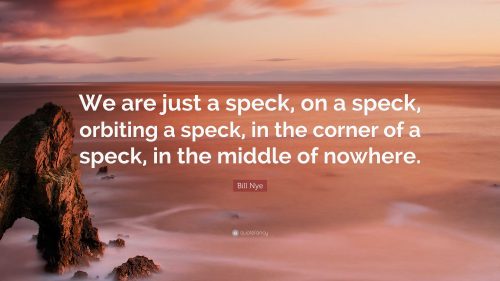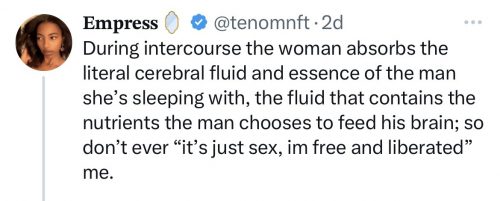Oh god. Avi Loeb waxes philosophical, and he sounds like a crackpot theologian rather than a crackpot scientist. He wants to claim that aliens exist because it will make him feel good while simultaneously arguing that his critics disagree with him because they want to unique and special. It’s an amazing load of very special bullshit.
First he tries to persuade his readers that our existence is pointless because the universe is so very large and ancient, making us a tiny inconsequential speck in the immense cosmos. And somehow, thinking that we’re all alone gives us comfort?
We do not know what happened before the Big Bang, so cosmic history could have extended well beyond our experience, making our existence even less significant in the grander scheme of things. Given this perspective, the Copernican realization that Earth is not at the center of the observable Universe pales in comparison to the realization that our cosmic existence is pointless.
With this humbling backdrop hanging over our head, the possibility that we might be the only intelligent species gives us existential comfort. Our pride stems from our intellectual superiority relative to other natural species on Earth. The emergence of large-language-models of artificial intelligence (AI) with more connections than the number of synapses in the human brain, might bring us back to the sober realization that human intelligence is not the pinnacle of creation. If our technological products might be smarter than we are, who is to say that there are no others out there who are even smarter?
As of now, most of my academic colleagues argue that that the notion that we are not alone in the Universe is an “extraordinary claim” that requires “extraordinary evidence”. However, my common sense argues exactly the opposite: it is extraordinary and arrogant for us to assume that we are special.
That’s all nonsense. Speaking for most biologists, I think we generally agree that life is probably common in the universe — it’s just chemistry, after all. Our expectation that that is so has nothing to do with the idea that being alone would make us special, which is just Loeb’s own special brand of twisty illogic.
He doesn’t seem to realize that his critics are not arguing that the idea we are not alone in the universe is an extraordinary claim — we are arguing that his assertion that a transient observation of a rock passing through the solar system, or of tiny metal spherules at the bottom of the ocean, is piss-poor evidence of intelligent extraterrestrial intent. Loeb is making an extraordinary specific claim on the basis of weak evidence, and dragging a sledge through mud is not the kind of work needed to justify it.
Here’s a counter-example. The JWST has found a planet with emission spectra that suggest the existence of chemical products characteristic of life.
It may have detected a molecule called dimethyl sulphide (DMS). On Earth, at least, this is only produced by life.
The researchers stress that the detection on the planet 120 light years away is “not robust” and more data is needed to confirm its presence.
Researchers have also detected methane and CO2 in the planet’s atmosphere.
Detection of these gases could mean the planet, named K2-18b, has a water ocean.
Prof Nikku Madhusudhan, of the University of Cambridge, who led the research, told BBC News that his entire team were ”shocked” when they saw the results.
“On Earth, DMS is only produced by life. The bulk of it in Earth’s atmosphere is emitted from phytoplankton in marine environments,” he said.
But Prof Madhusudhan described the detection of DMS as tentative and said that more data would be needed to confirm its presence. Those results are expected in a year.
Are scientists freaking out an claiming that this can’t be so, that the data must be rejected because we have a prior certainty that alien life cannot possibly exist, we have to be alone in the unverse? No. That’s a really interesting result, cool stuff that ought to be pursued, but we also need to consider other alternative explanations. Madhusudhan is practicing a kind of cautious interpretation of the data that is totally alien to Loeb.
Scientists don’t seem to have the kind of knee-jerk hostility to the premise of extratrerrestrial life that Loeb imagines. Instead, we’re hostile to bad evidence advanced in service of half-assed hypotheses.
But he worked so hard on gathering ‘data,’ how dare anyone criticize him.
Traveling to the Pacific Ocean for two weeks to retrieve millimeter-size spherules that melted off the surface of IM1 and settled on the ocean floor at a depth of 2 kilometers across a ten-kilometer region, and analyzing these spherules by a state-of-the-art mass spectrometer at Harvard University for two months, was hard work that culminated in a 44-pages-long scientific paper. Tweeting superficially about the findings was an easy escape route for all the naysayers who chose to behave unprofessionally and harass our research team for following the scientific method.
In the imagined reality of cosmic loneliness, our cosmic significance is self-declared. We can ignore packages in our backyard by not searching for them or by ridiculing any search made by the true scientists among us. But irrespective of what some of us tweet, an objective observer of IM1 or `Oumuamua would repeat Galileo’s words: “E pur si mouve” (and yet it moves).
No one is claiming that `Oumuamua didn’t move. That was an observable fact. Rather, those superficial tweets he finds objectionable were by people disagreeing with his claim that its movement was intentional and planned by an extraterrestrial intelligence. Rocks move through space all the time. Spaceships, especially spaceships from an extrasolar origin, are considerably more rare, and you need to be prepared to demonstrate why you attach such an extraordinary cause to it.
And there he goes, trying to hide behind the “scientific method.” His whole research program is a collection of slipshod rationalizations for his a priori biases, backed with haphazard observations that don’t actually support his ideas. His version of the ‘scientific method’ is damned sloppy.
But it gives him meaning, he says.
My second important point is that finding interstellar senders would bring a meaning to our meager cosmic existence. In our personal life, finding a partner often gives us meaning because it channels existential sentiments back to us, providing us comfort. And this comfort is better than that afforded by arrogance and loneliness. The sense of pointlessness brought by comprehending the Universe must have resulted from the focus of cosmologists on lifeless entities, like elementary particles or radiation. If we find a partner out there, the cosmos might not be pointless anymore.
That’s a religious argument — just replace “interstellar senders” with “god,” and it’s the ordinary ravings of a thousand clueless preachers who really, really want you to believe. How can you find meaning in your pathetic, lonely existence if you don’t have Jesus, I mean, Aliens?
His logic doesn’t even hold up internally. If humans are but brief, insignificant specks in a gigantic universe, how does finding another tiny speck suddenly bring us cosmic significance? Oh, but it would make Avi Loeb feel better about his speckiness if he could imagine sharing it with another speck.
And yet, the tininess of my speck neither causes me regret nor makes me seek out bigger, more powerful imaginary specks. Funny how that works.








